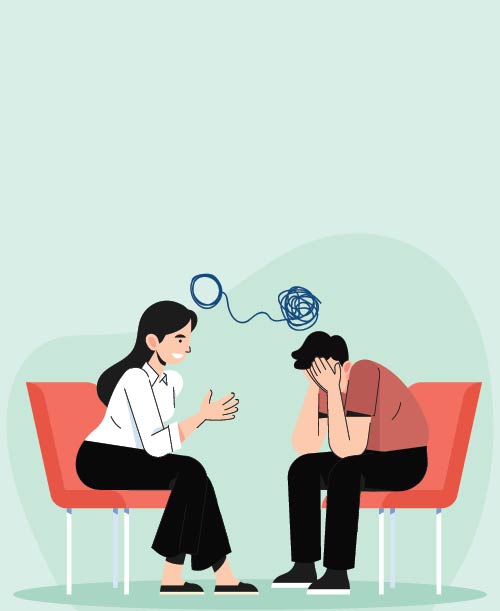The Relevance of Mental Health And Wellness: a Deep Study Therapy, Therapy, and Their Benefits
Mental health and wellness greatly forms specific well-being, impacting emotions, ideas, and habits. Counseling and treatment function as essential opportunities for recovery and individual growth. They supply structured assistance, helping individuals browse life's difficulties. Yet, numerous stay uninformed of the certain kinds of therapy readily available and their distinct benefits. Understanding these aspects is very important for any individual taking into consideration specialist psychological health support. What complies with may brighten paths to durability and fulfillment that numerous overlook.
Understanding Mental Health And Wellness and Its Impact
Psychological wellness is usually forgotten, it plays a vital role in general health and daily functioning - Couples Therapy. It encompasses emotional, emotional, and social factors that affect exactly how people believe, really feel, and behave. An individual's psychological health and wellness directly affects their capacity to deal with stress and anxiety, connect to others, and make choices. Poor psychological health can result in various problems, consisting of stress and anxiety, depression, and problem in preserving partnerships, all of which can impede professional and individual growth.Furthermore, psychological health has significant implications for physical wellness. Chronic anxiety and unattended mental conditions can contribute to numerous physical ailments, such as heart condition and weakened immune feedbacks. Conversely, favorable psychological health and wellness promotes durability, making it possible for individuals to handle life's difficulties successfully. Comprehending mental wellness's importance is vital for promoting supportive settings that advertise psychological wellness, thus improving the high quality of life for people and communities alike
The Different Sorts Of Therapy and Treatment
In the domain of psychological health and wellness, different counseling and treatment kinds provide to varied needs. Individual therapy strategies focus on personal concerns through individually sessions, while group therapy characteristics foster shared experiences and support among participants. Recognizing these modalities is necessary for choosing the suitable treatment for various challenges.
Private Counseling Techniques
Numerous specific counseling methods exist, each made to resolve certain psychological health and wellness concerns and deal with differing customer requirements. Cognitive Behavior Modification (CBT) focuses on identifying and changing adverse thought patterns, while Psychodynamic Treatment discovers unconscious procedures and previous experiences. Humanistic Therapy highlights personal growth and self-actualization, cultivating a helpful setting. Social Treatment (IPT) targets relationship concerns and communication patterns to boost emotional health. Additionally, Approval and Dedication Therapy (ACT) motivates customers to accept their ideas and feelings while committing to personal worths. Each approach offers unique techniques and approaches, permitting professionals to customize their approaches to the individual, thus improving the restorative experience and advertising psychological health healing.
Group Therapy Characteristics
Group treatment dynamics encompass different therapeutic methods that utilize the power of social partnerships and shared experiences. This type of therapy commonly includes varied groups, fostering a safe atmosphere for individuals to reveal feelings and thoughts. Key kinds of group treatment include support teams, which give emotional assistance; process-oriented groups, concentrating on interpersonal communications; and psychoeducational teams, focused on presenting knowledge regarding mental wellness issues. The characteristics within these groups can enhance self-awareness, as members usually review their habits in connection to others. In addition, group therapy fosters a sense of belonging, decreasing sensations of seclusion. With shared narratives and collective problem-solving, individuals can develop dealing strategies and gain understandings, eventually adding to individual growth and recovery.
The Duty of Therapy in Mental Health
Therapy plays a necessary duty in psychological wellness by supplying numerous techniques tailored to individual demands. These methods give expert guidance that can result in considerable improvements in psychological wellness. Understanding the different types of counseling can help people make notified choices about their mental health and wellness care.

Kinds of Counseling Methods
While various therapy approaches exist, each offers unique methods and understandings into mental health treatment - Couples Therapy. Amongst the most famous are cognitive-behavioral therapy (CBT), which concentrates on modifying negative thought patterns; psychodynamic therapy, which checks out subconscious procedures and youth experiences; and humanistic approaches, stressing individual growth and self-actualization. In addition, solution-focused short treatment prioritizes discovering remedies in the existing as opposed to delving right into troubles. Group treatment fosters community and shared experiences, while family members therapy addresses relational characteristics within familial frameworks. Each technique accommodates various requirements, straightening with specific preferences, issues, and healing goals. Recognizing these methods assists customers make notified choices about their psychological health and wellness journey and advertises reliable treatment customized to their one-of-a-kind conditions
Benefits of Professional Advice
Numerous people profit from specialist guidance in managing their psychological health challenges. Therapy uses a risk-free room for clients to discover their ideas and sensations without judgment. This healing environment fosters self-awareness, enabling individuals to recognize patterns in their actions and establish much healthier coping approaches. Expert assistance also provides access to evidence-based methods that can relieve signs and symptoms of anxiety, anxiety, and other psychological wellness problems. Therapists can aid in establishing reasonable goals and offer assistance in accomplishing them, improving total well-being. The collective relationship between therapist and customer is crucial, as it promotes responsibility and encourages personal growth. Inevitably, professional advice plays a vital function in steering psychological health trips, leading to improved emotional strength and life contentment.
Advantages of Treatment: Healing and Development

How to Select the Right Specialist or Therapist
Exactly how can one browse the often overwhelming procedure of selecting the ideal therapist or therapist? Recognizing individual requirements is crucial; people ought to consider their specific problems, whether anxiety, anxiousness, or partnership obstacles. It is valuable to study various healing techniques, such as cognitive-behavioral therapy or psychodynamic treatment, to find a suitable match.Next, prospective clients should seek recommendations from trusted resources or use on-line directory sites. It is vital to evaluate therapists' credentials, including their education, licensing, and areas of field of expertise. Arranging first examinations can help evaluate compatibility, enabling people to assess interaction designs and individual comfort.Finally, logistical elements, such as area, availability, and fees, must also be taken into consideration. By thoughtfully evaluating these elements, one can make a notified decision, eventually cultivating a restorative connection that supports psychological wellness and personal growth.
Getting Over Stigma: Accepting Mental Wellness Assistance
While social attitudes towards psychological wellness have advanced, stigma still presents a significant obstacle for several looking for support. This stigma typically manifests as mistaken beliefs bordering mental illness, leading individuals to feel pity or worry regarding their battles. Many individuals hesitate to go after counseling or treatment due to stress over being evaluated or labeled. Conquering this preconception is basic for cultivating a helpful atmosphere where people can openly discuss their psychological health needs.Communities and organizations play an essential function in this transformation by advertising recognition and education about psychological health issues. Efforts that highlight personal tales can humanize these experiences, urging others to seek aid without concern. As acceptance grows, people might feel a lot more empowered to welcome mental wellness support, recognizing it as a necessary element of general health. By taking apart stigma, culture can cultivate a society of understanding, compassion, and positive psychological healthcare.
Methods for Keeping Psychological Wellness Outside of Therapy
Although treatment supplies useful support, maintaining psychological well-being beyond sessions is just as crucial. People can implement several approaches to sustain their psychological wellness. Normal exercise plays an essential duty, as workout advertises the launch of endorphins, which improve state of mind. Additionally, a well balanced diet regimen rich in nutrients can substantially impact psychological stability and power levels.Practicing mindfulness and meditation aids individuals handle anxiety and develop higher self-awareness. Establishing a regular rest regimen is likewise basic, as high quality rest is crucial for cognitive feature and psychological regulation.Engaging in social tasks promotes link and minimizes sensations of seclusion. Seeking hobbies or rate of interests can offer an imaginative electrical outlet and increase self-worth. go to the website Exercising and setting sensible objectives self-compassion permits individuals to cultivate strength. By integrating these approaches into life, individuals can efficiently sustain their psychological health past treatment sessions.
Often Asked Inquiries

How Can I Tell if I Required Therapy?

Determining the need for therapy usually includes recognizing relentless sensations of sadness, anxiousness, or overwhelming stress and anxiety. If day-to-day working comes to be tough or coping devices fail, looking for expert assistance might be a useful action ahead.
What Should I Anticipate in My First Treatment Session?
In the first therapy session, individuals can anticipate an intro, discussion of their factors for looking for aid, and a summary of the specialist's method, creating a structure for future discussions and establishing comfort in the healing room.
Are Online Treatment Sessions as Effective as In-Person Ones?
Research suggests that online treatment sessions can be as reliable as in-person ones. Variables such as the specialist's qualifications, customer interaction, and the restorative partnership substantially affect results, regardless of the tool utilized.
Can Treatment Assist With Connection Problems?
Treatment can help people in resolving connection problems by supplying tools for communication, understanding check out here emotions, and dealing with disputes. Couples Therapy. It advertises much healthier characteristics and encourages individual development, eventually cultivating stronger, extra fulfilling links between companions
For How Long Does Treatment Typically Last?
Therapy duration differs substantially based on individual demands and objectives. Commonly, sessions may last from a couple of weeks to a number of months, with some individuals participating in ongoing therapy to address long-term concerns and individual growth. Cognitive Behavioral Treatment (CBT) focuses on recognizing and altering negative thought patterns, while Psychodynamic Treatment explores past experiences and unconscious procedures. Key types of team treatment consist of assistance teams, which offer psychological assistance; process-oriented groups, focusing on interpersonal communications; and psychoeducational teams, intended at giving understanding regarding psychological health issues. Amongst the most popular are cognitive-behavioral treatment (CBT), which focuses on changing unfavorable idea patterns; psychodynamic therapy, which discovers unconscious procedures and childhood experiences; and humanistic approaches, stressing individual growth and self-actualization. Team treatment fosters community and shared experiences, while family therapy addresses relational dynamics within familial frameworks. It is valuable to research study numerous restorative methods, such as cognitive-behavioral therapy or psychodynamic treatment, to find an ideal match.Next, possible clients ought to look for recommendations from relied on resources or make use of on the internet directories.